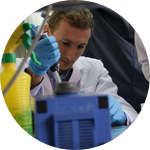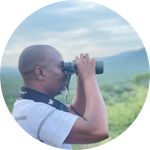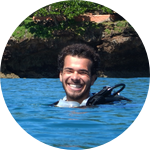About This Project
Coral symbionts provide the host with nutrition and adaptive capacity to environmental changes. This potential is hardly integrated in restoration plans. This project will characterize microbes from corals in artificial and natural reefs to identify taxa associated with responses to stressors for use as indicators in monitoring. Taxa associated with promoting health and resilience will be recommended for use as environmental probiotics or in microbiome engineering to improve coral survival.
Ask the Scientists
Join The DiscussionWhat is the context of this research?
The role of bacteria in providing the coral host with nutrients, support for growth and development, protection against pathogens, and mitigation of environmental stressors and of the algal symbiont in providing nutrition is well established. The potential of these symbionts inoculations to promote coral health and ameliorate bleaching-related stress and mortality has been demonstrated. But the characterization of coral symbionts is in its infancy and whether the beneficial or harmful consortia are location-specific is unknown. Modern high throughput sequencing technologies (HTS) provide efficient means for comprehensive profiling of microbes. We have the unique opportunity to fill this gap since HTS protocols are well-established in our laboratory.
What is the significance of this project?
Resilient coastal ecosystems are crucial for the livelihoods of coastal communities; they provide food, coastal protection and opportunities for tourism. Symbionts play significant yet unrecognized role in the health and adaptive capacity of corals organisms to a rapidly changing environment. Microbes contribute to the physiology, development, immunity and behavior of corals, and respond rapidly to environmental perturbations, providing a mechanism for acclimatization. Symbiodiniaceae, on the other hand, provides most of the nutrition allowing corals to occupy oligotrophic waters. Fluctuations in symbionts can have significant functional consequences for the holobiont health. Understanding the beneficial and harmful taxa is crucial for monitoring and informing other restoration strategies.
What are the goals of the project?
Microbial DNA will be extracted from thermotolerant corals in nursery and bleaching corals in the natural reef with appropriate controls. Library preparations will be done for amplicon metagenomic sequencing of barcodes 16S, for bacteria and archaea, and ITS-2, for Symbiodinium algae. Quality control and taxonomical classification of the sequences shall be done by DADA2, an exact amplicon sequence variant (ASV) inferring bioinformatic tool running on the R programming environment. Comparisons will be made between nursery and natural reef treatments to identify taxa associated with thermotolerance, bleaching and death for use as monitoring indicators and for potential inclusion, of the beneficial consortia, in other restoration applications e.g. environmental probiotics.
Budget
Seed funding for this project has been provided by REEFolution Trust which helped cover significant amount of the sampling, and optimization of laboratory processing protocols. The requested budget items will help complete the projects by covering essential aspects including field costs (e.g. fuel) for the remaining sample collection, and laboratory consumables for microbial DNA extraction and amplicon library preparations for sequencing. The sequencing budget line will cover both shipping and sequencing costs to generate sequence data for analyzing microbial communities. These resources ensure comprehensive execution from sample collection to data analysis and presentation, enabling the identification of microbial indicators critical for coral restoration efforts.
Endorsed by
 Project Timeline
Project Timeline
The project began in January 2024 and is scheduled to be completed in September 2025. I collected most samples in January and March 2024 and, will collect a few more. By February 2025, I intend to finish the analytical phase. By September 2025, I hope to have compiled all the project’s data and will be able to offer funders the project’s key findings. I also plan to share recommendations with restoration organizations and the scientific community by publishing my findings.
Aug 08, 2024
Project Launched
Sep 06, 2024
Sampling
Sep 20, 2024
Laboratory analysis
Oct 01, 2024
Sequencing
Oct 31, 2024
DNA sequence analysis
Meet the Team
Affiliates
Team Bio
This project includes two additional team members: Dr. Sammy Wambua, a lecturer and principal investigator at Pwani University Bioscience Research Centre, and Dr. Ewuot Knoester from Wageningen University, also a principal investigator at the REEFolution Foundation. Dr. Wambua's expertise in conservation genomics and metagenomics makes him a valuable asset. Dr. Knoester, a marine ecologist, leads coral restoration projects, bringing crucial expertise to our initiative.
Salome Chemutai
My name is Salome Chemutai, and I am a second-year master's student in Microbiology at Pwani University in Kenya. I also work as a research assistant at the Pwani University Bioscience Research Centre, where I work on conservation genomics projects involving sea turtles, elephants, monkeys, and corals. In addition to my research, I am a trained Biology teacher and occasionally assist in teaching genetics courses to undergraduate students as a way of mentoring young aspiring scientists. My passion for nature conservation, combined with the guidance of my supervisor, the principal investigator at the research center, has deeply influenced my interest in this field. I am particularly interested in conservation biology, marine microbiology, and population genetics. This fascination began during my volunteer work as a research assistant, where I observed the delicate balance of marine ecosystems and the vital role of microorganisms in maintaining coral health. The urgent need to address the global decline of coral reefs resonates strongly with me. I believe that preserving these ecosystems is crucial for the biodiversity and health of our oceans. Currently, I am involved in a project focusing on the symbiomes of corals under restoration in the Southern Coast of Kenya. My commitment to conservation has led me to apply for this grant to implement a project aimed at identifying microbial indicators of coral health. By developing a rapid and efficient method for coral monitoring, my goal is to enable immediate responses to threats such as bleaching, helping to preserve these vital ecosystems before irreversible damage occurs. My dedication to this work is driven by a desire to contribute to sustainable solutions that can protect and restore coral reefs for future generations.
Sammy Wambua
I have employed molecular biology in biomedical research for over 20 years. I have recently switched to utilizing genomics to explore and protect tropical species of conservation concern. Ongoing research includes population genomics for East African corals, sea cucumber and cichlids, immunogenetics of sea turtles, and microbiome analysis of corals, seagrass, and mangroves.
Ewout Knoester
Performing research for Wageningen University in collaboration with the REEFolution Foundation in Kenya on how to improve the efficiency of coral reef restoration, with a focus on 1) Improving restoration efficiency by integrating ecological processes, 2) Making restoration future proof by exploring heat resilience of restored corals and 3) Enabling upscaling of restoration efforts by improving the cost-efficiency of applied techniques.
Project Backers
- 4Backers
- 133%Funded
- $6,025Total Donations
- $1,506.25Average Donation





